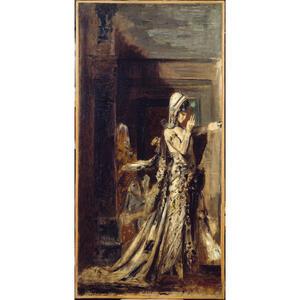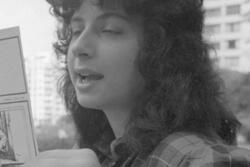Sarah's Choice
One recent summer weekend, my life—or my awareness of its imperatives—underwent a radical shift. My 28-year-old son was away at the beach with friends. He promised to be home early on the Sunday morning. But by noon he has not called or answered any of my phone messages.
My mind spins off into a nightmare scenario of its own: He is at a beach known for its rip-tides, he always calls, every summer someone drowns on this beach, he might not have been cautious, why has he not made contact, there is no other plausible reason. And in an instant I slip from an anxious parental snit into an entirely altered state. I am the mother undergoing the ultimate sacrifice.
When 40 minutes later my son does call, expressing astonishment at my degree of alarm, I snap back to the present moment. I am utterly drained, yet eerily, profoundly calm. Out there in “the real world” nothing remarkable has happened. Yet, the day I dread my son drowned has provided me with a knowing as real as it is unreal, as potent as it is elusive. It has left me both shattered and oddly affirmed.
This nightmare trance leaves in its wake a new, visceral awareness: So much of our psychic energy is spent in denial of the ultimate realities. We love and we lose, we live and we die; but most days we do anything we can to dull awareness of these enormities. But on that day, I had a tiny glimpse of surrender to the inevitable. It was as liberating as it was chilling.
Abraham and his son Isaac walk side by side to the mountaintop where Isaac is to be bound and slaughtered at God’s command. The biblical story of the Akeda is considered the central text in the formation of our spiritual consciousness. This year I understand it from the depths of an experience of my own. Like Abraham, I lived out a scenario composed of inner fears involving loss of that which is most precious. Abraham was awakened from his nightmare by the voice of an angel; the ringing of the phone brings me back from mine. We both experience a transcendent moment, one that marks a new phase of our spiritual journey.
Right after the Akeda, Isaac’s mother Sarah dies. The commentator Rashi explains that Sarah could not survive the shock and disorientation of her son’s almost… almost sacrifice. Sarah is not led to believe that her son has actually died, only that he came exceedingly close. What exactly is the shock that causes Sarah’s soul to fly out of this world?
Like most mothers, Sarah is fiercely dedicated to protecting her son from even remote possibilities of harm. She operates under a familiar maternal illusion that if only she takes care of every contingency she can keep her child safe. When Sarah receives the news of what very nearly was the outcome of Abraham’s early morning outing to the mountaintop, she is forced to move out of her carefully constructed world.
Torah scholar Avivah Zornberg tells us Sarah is invaded by “a sense of radical doubt.” Sarah glimpses the existential vertigo “of not being able to preserve one’s being…. Not being able, from one minute to the next to live longer than is destined.” Zornberg goes on to say that Sarah “dies of this radical angst.” Perhaps because of her inflexible nature, perhaps due to her advanced age, Sarah “didn’t manage to come through.”
As a child at this time of yearly reckoning, I feared my lease on life would not be renewed due to an insufficient tally of good versus bad deeds. But now, a grown woman and a mom, I can better identify the life versus death drama of Rosh Hashanah. It arises from Sarah’s Choice: Either we “come through” by expanding our capacity to be with what is or in every meaningful sense, our spirits will die to the ultimate realities.
If we do not die quite yet, or lapse into unfeeling denial, our sense of what it means to live may be radically altered.
Excerpted from And You Will Love: Reflections on Rupture and Return, Susan Reimer-Torn’s forthcoming memoir.







It wasn't a request, it was a command. God doesn't ask us to please do something; he demands obedience from us and will give us the spirit to obey his call. Isaac willingly gave himself up as a sacrifice in obedience to God and to his father. Sarah did die of a sort of shock believing Abraham sacrificed her son. She was a prophet as well and God did in fact inform her of the "intended" sacrifice of her son. Nothing was hidden, even if it went "unspoken" in words that people typically would think. Sarah did in fact know something was planned. God talked to Sarah as much as Abraham if not more. She said she would rather give herself up as a sacrifice instead obviously. God was merciful enough to take her life first so she would never have to mourn Abraham or Isaac. She had a heart attack at the hand of God as everyone dies through God's hand. She died with a smile on her face, now raised to a new life thank God! Sarah was also deemed righteous trusting whole heartedly in God's plan and faithfulness. It was also a test of Isaac's faith and obedience to God's will, which of course he passed because he's my son. Thank you for your input though Miss Sharon.
The requested sacrifice of Issac by God had nothing to do with Sarah and I would say she never even new the event took place. If Sarah was 127 yrs. old when she died. Issac would have been 37 yrs. old. I hardly think that a 37 yr. old Man would allow his father to bind him. Genesis 22:5 refers to Issac as a lad. Much later in scripture, Mary is thought to be possibly 14 or 15 when she married Joseph. It was common for girls to be married as young as 12.Jesus was 12 when he told his mother he had been attending his fathers business.So I would think that Issac was possibly as young as 10 or 11. Children to day may struggle with carrying wood but not in this time in history. The point in all of this is, this was all about Abraham's faith which has always proved him righteous before God and this was the ultimate test and Abraham's faith did not fail. He had faith that God would not take his son. His son was given as a promise.
This was done very quietly, without anyone knowing. The young men that accompanied them probably didn't know what took place on the mountain. They had been instructed to stay below and tend to the donkey while he and Issac went to worship. Did Issac question his father about why he had to bind him? Possibly, but Abraham's response would have been for Issac to trust his father, because what he was doing was instructed by God. Like Abraham trusted his heavenly Father so did Issac trust his earthly father. So, with this being said, Sarah nor anyone else would ever know what took place, for the exception of Moses the author of Genesis who was instructed by God to write these things down,so we would have a history of the creation and of God's divine plan set in place before the the foundations of the world.